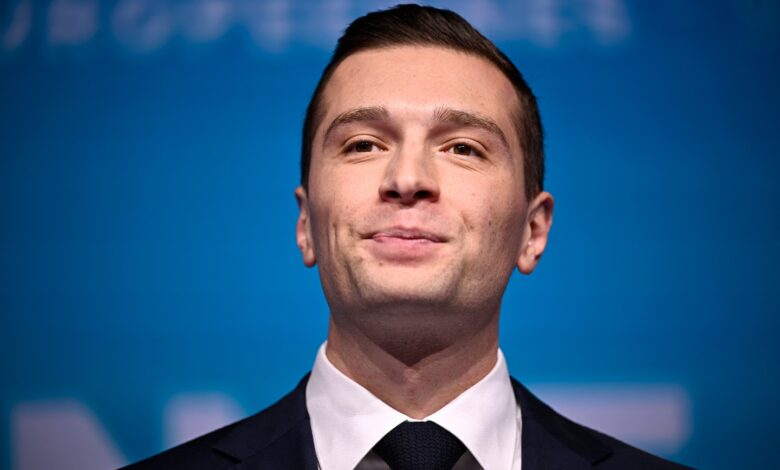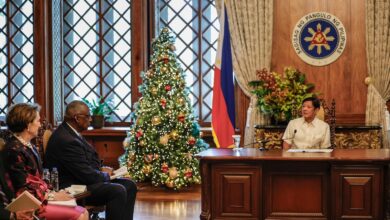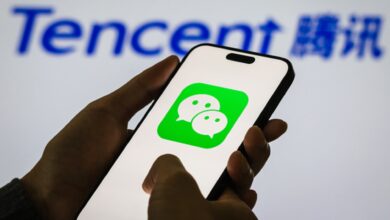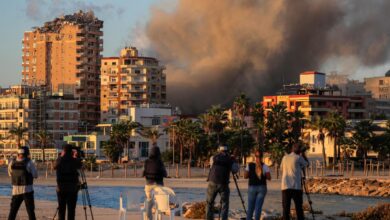France elections cast spotlight on Jordan Bardella’s National Rally party

Projections showed the National Rally at the top with 33 percent of the vote in what would be the party’s second triumph under Bardella. He was earlier widely hailed for the National Rally’s triumph in June’s European elections, where it won about 31.4 percent of the vote, more than double the share of the vote won by French President Emmanuel Macron’s centrist Renaissance Party coalition.
The E.U. election results pushed Macron to take a risky gamble to dissolve the country’s Parliament and announce snap polls, a move which appears to have backfired.
Born in 1995 to a family with Italian roots, Bardella was raised in the disadvantaged northern suburbs of Paris. He joined the National Rally (then known as National Front) at the age of 16 when Marine Le Pen, doyenne of French nationalist and Euroskeptic politics, was taking over the party from her father, Jean-Marie Le Pen.
Bardella would go on to work on Marine Le Pen’s presidential campaign in 2017. Five years later, he was elected as the first person to lead the party outside of the Le Pen family.
GET CAUGHT UP
Stories to keep you informed
Bardella has built a following among young voters, including a large follower base of 1.7 million on TikTok.
While his critics see Bardella as a puppet for Le Pen, his fans point to his rise from working-class origins to the top echelons of French politics as a matter of inspiration.
Pierre-Stéphane Fort, an investigative journalist and the author of a new book on Bardella, previously told The Washington Post that Le Pen, a middle-aged heiress, saw the value in Bardella’s origin story and modeled him into a marketable, social-media-savvy surrogate who could reach new voters.
What is National Rally and its platform?
The far-right anti-immigration and nationalist party was founded in 1972 and was led by Jean-Marie Le Pen until 2011. Le Pen is a convicted Holocaust denier and has been fined thousands of euros by courts for his repeated comments trivializing the systematic extermination of Jews in World War II.
For the next decade, the party was led by his daughter Marine Le Pen, who attempted to move the party away from its antisemitic image. In 2015, the party expelled Jean-Marie Le Pen following an interview in which he described Nazi gas chambers as a “detail of history.”
Marine Le Pen renamed the National Front as “Rassemblement National,” or National Rally, in 2018. Critics were quick to point out that the name was similar to that of the Popular National Rally, a political group that collaborated with France’s pro-Nazi government during World War II.
Under her leadership, the party came closest to the presidency when she faced off against Macron in 2017 and 2022. She lost both times.
What happened in the first round of French Assembly elections?
While the National Rally led projections with 33 percent of the vote, an alliance of the leftist parties was projected to come second with 28 percent. Macron’s Together alliance received a drubbing with 21 percent, according to exit polls.
In a statement Sunday, Bardella promised to promote “unity” if he became prime minister, but continued to attack his main competitor, a leftist alliance, saying their win “would lead the country to disorder, to insurrection and the ruin of our economy.”
Without admitting defeat, Macron praised the high voter turnout, calling for “a broad, clearly democratic and republican rally for the second round,” in a statement.
If the next round does not deliver a clear majority for one party or alliance, it could paralyze French politics, experts say. “The French crisis has only just started,” Gérard Araud, a former French ambassador to the United States told The Washington Post, comparing Macron’s snap poll gamble to emperor Napoleon Bonaparte’s failed campaign to invade Russia in 1812.
What would a National Rally win mean for France?
If the National Rally can expand its lead in the second round, it could form the country’s first far-right government since World War II, forcing what’s known as a cohabitation government, with Macron as president for the remainder of his term until 2027, and Bardella as prime minister.
A majority of seats in the National Assembly and its party leader as prime minister would give the National Rally more power to push its populist, Euroskeptic and anti-immigration ideas into the political mainstream and to prevent Macron from enacting his pro-Europe, pro-business agenda.
It could also spell trouble for the European Union, which the party once campaigned to leave. Although it has softened its stance, and no longer advocates for France to leave the E.U., many of its policies remain at odds with the bloc. There are also questions over what a National Rally government might mean for the war in Ukraine. Bardella has opposed sending longer-range missiles to Ukraine that could target Russian territory, Le Monde reported, and is also against French soldiers being sent to fight in Ukraine, which Macron has not ruled out.
Rick Noack, Emily Rauhala, Anthony Faiola and Virgile Demoustier contributed reporting.






